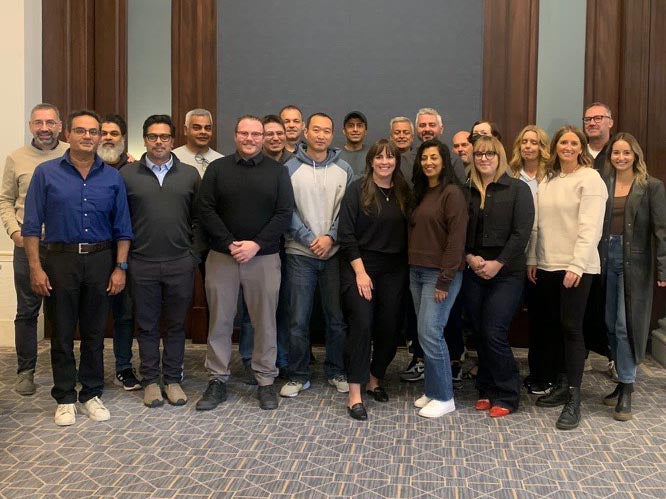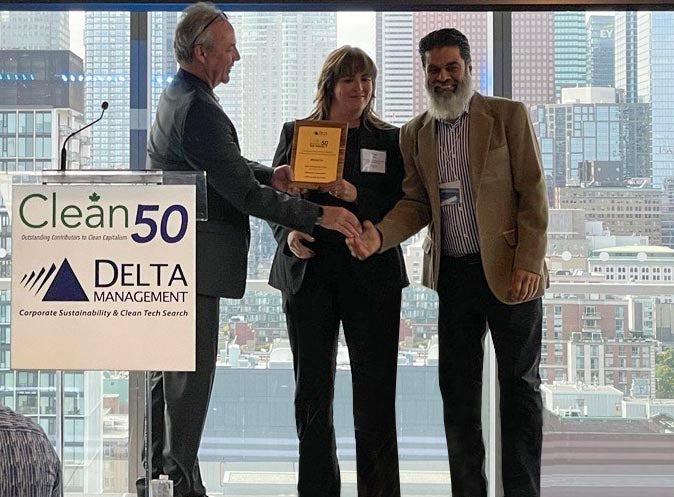Mondetta was founded on hard work and a commitment to doing what’s right.
Our Mission Statement:
We’re passionate about making fashion-forward and responsibly sourced apparel accessible to all while reducing our environmental impact and giving back to our community locally and abroad. We lead with integrity, transparency, and respect for people and the places we operate, all the while knowing doing the right thing is the right thing to do.
Engagement with Environmental, Social, Governance (ESG) at Mondetta
The Board

Ash Modha, BA – CEO and Founder
Board Member
Having started the company in his teens, Ash's dedication to and passion for entrepreneurship, fashion, and design have helped him lead and guide Mondetta/MPG over its nearly 40 years in business. There have been ups and downs, but by remaining adaptable and able to pivot when necessary, Ash has helped the company grow.
In addition to leading Mondetta Clothing, Ash has engaged in several philanthropic and voluntary pursuits, including the board of directors for the Health Sciences Foundation, the Bank of Canada Blue Ribbon panel, the Royal Bank Young Advisory Council, the Premier's Economic Advisory Council during which time he also chaired an image task force, and the Minister's Trade Advisory Council. Presently, he sits on the Board of Trustees at Balmoral Hall School, is a member of the Manitoba Business Council, and is a board member of that organization's Truth and Reconciliation Committee. Ash is also the vice-chair of the Asper School of Business Associates' IDEA Dinner committee. Manitoba Premier Wab Kinew recruited him to serve as a special advisor on his transition team following a historic election that witnessed a Canadian province elect its first Indigenous premier. Since then, he appointed Ash co-chair of the Premier’s Business and Jobs Council.
He enjoys staying active and travelling with his wife and young daughter when he's not at the office.

Prashant Modha, MBA, CFA, CMA, CPA – CFO and Founder
Board Member
With a mind for numbers and an aptitude for strategic thinking, Prashant has served as CFO and a trusted strategic adviser with acute business acumen since Mondetta's inception. He loves a challenge and is a problem solver, able to find solutions and new avenues to pursue to ensure the company's success. He previously served on the board of the Young Associates (1994-2000) and is presently the chairman of the Mondetta Charity Foundation. When he's not checking spreadsheet figures, he enjoys watching CFL football and exploring new cultures.

Raj Bahl, BA – EVP Sales and Founder
Board Member
The tenets and concepts of karma form a large part of Raj's business philosophy: following principles of cause and effect means the company adheres to and insists upon fair practices from customers and suppliers alike. Always comporting himself with integrity has allowed Raj to form, cultivate, and maintain lasting relationships with retail partners, contributing to the company's success. Away from the office, Raj enjoys spending time with his wife and attending his kids' various sporting pursuits.
Compliance Mechanisms
Practical ESG work requires verification.
- Certifications, standards, policies, and compliance instruments are central to our ethical and responsible practices.
- These guidelines guide our efforts to minimize environmental impact and maximize beneficial social factors.
- They also help enhance our positive contributions to society.
ESG Advisory Committee
- Our ESG advisory committee provides recommendations to our executive leadership team on strategies, programs, policies, goals, and disclosures related to sustainability and ESG matters.
- The committee provides a solid foundation for considering ESG impacts on risk management, decision-making, and aligning our action plans with established ESG targets.
Continuous Improvement & Stakeholder Engagement
- We have committed to regular materiality analysis to engage our stakeholders actively.
- ESG is an evolving journey for which we’ve developed an adaptable framework to remain dedicated to continuous improvement and innovation.
- We base materiality analyses on existing SDG, SASB, and GRI frameworks.
ESG Advisory Committee

Brian Lerner
Chair
As the company’s lead legal counsel, Brian has a high level of understanding and insight into the company’s operations. He can provide guidance and advice on all of our ESG programs.

Erika Spiring
Member
As our Executive Director - Design and Production, Erika is well-versed with every element of our supply chain and is crucial in implementing new ESG initiatives and efforts.

Christie McLeod
Member
Formerly our MCF executive director, Christie is now a practicing environmental lawyer who also focuses on Indigenous matters in Canada.

Connie Walker
Member
As the former president of United Way – Winnipeg, Connie’s perspective is invaluable to the social-specific aspects of our ESG efforts.


Compliance Mechanisms
Practical ESG work requires verification.
- Certifications, standards, policies, and compliance instruments are central to our ethical and responsible practices.
- These guidelines guide our efforts to minimize environmental impact and maximize beneficial social factors.
- They also help enhance our positive contributions to society.
Key Compliance Mechanisms
Certifications, standards, policies, and compliance instruments are central to our ethical and responsible practices.
Social Compliance Policy to ensure stringent social compliance aligned to the ILO’s fundamental freedom principles.
Chemical Specifications & Banned Chemical, Dyes & Substances Policies for the elimination of harmful chemicals and restricted substances (aligned to the Restricted Substance List -RSL) from the supply chain and our products.

Continuous Improvement & Stakeholder Engagement
- We have committed to regular materiality analysis to engage our stakeholders actively.
- ESG is an evolving journey for which we’ve developed an adaptable framework to remain dedicated to continuous improvement and innovation.
- We base materiality analyses on existing SDG, SASB, and GRI frameworks.


Materiality Analysis Objectives
Mondetta recognizes the significance of ESG factors in driving long-term value and ensuring resilience in a rapidly changing world. By conducting an ESG materiality analysis, we aim to achieve the following objectives:

- Identify ESG issues: Identify and evaluate the range of ESG issues that are relevant to our organization, considering the nature of our operations, industry, and stakeholder expectations.
- Prioritize material ESG issues: Determine the materiality of identified ESG issues by assessing their potential impact on our organization's (financial) performance, reputation, and ability to create sustainable (environmental and social) value.
- Stakeholder engagement: Engage with key internal and external stakeholders to understand their perspectives, expectations, and concerns regarding identified ESG issues, ensuring the analysis reflects diverse viewpoints.
- Strategic alignment: Align our sustainability strategy, policies, initiatives, evaluation, and reporting efforts with the most material ESG issues, enabling us to focus on areas where we can have the greatest positive impact (with more focus and less cost).
Mondetta’s Strategic Roadmap
Managing Environmental, Social, Governance



Mondetta’s
B Corp™ Certification
B Corps™ value people and the planet, not just profits. When you support B Corps™, you support a movement of people using business as a force for good. We aspire for all business to do the same.
Mondetta became a Certified B Corporation® in January 2021.
B Corporations are assessed on governance, workers, community, environment, and customers.
Mondetta’s B Corp™ Impact Score: 109.9
Being a B Corp™ is an important distinction for any clothing company committed to sustainability, social responsibility, and ethical business practices. B Corps™ are certified by the nonprofit B Lab™ as meeting strict standards of environmental and social performance, transparency, and accountability. For a clothing company, this means a commitment to reducing waste and emissions, using sustainable materials, supporting fair labor practices, and giving back to the community. It also means being transparent about these efforts and being accountable to stakeholders beyond just shareholders. By becoming a B Corp™, a clothing company can demonstrate its commitment to doing business in a way that’s good for people, planet, and profits, and inspire others in the industry to do the same.
The B Corp™ assessment covers a wide range of aspects related to a company’s impact on society and the environment. These include:
| Category | Description | Verified Score |
|---|---|---|
| Environmental Performance | The evaluation of a company’s impact on the environment, including its energy use, water consumption, waste generation, and greenhouse gas emissions. | 31.4 |
| Worker Welfare | The assessment of a company’s commitment to fair labor practices and worker well-being, including wages, benefits, safety, and equal employment opportunities. | 30.1 |
| Community Engagement | The evaluation of a company’s involvement in and contribution to the communities where it operates, including charitable giving, volunteerism, and support for local businesses and organizations | 24.1 |
| Governance | The assessment of a company’s leadership and management practices, including its commitment to transparency, ethical decision-making, and accountability to stakeholders. | 19.5 |
| Customer Stewardship | The assessment of a company’s commitment to quality products and ethical marketing, as well as its data privacy and feedback channels. It also recognizes products and services that address social problems, such as health and education, and those that serve underserved customers or improve the social impact of other businesses or organizations. | 4.5 |
The assessment evaluates the company’s practices in areas such as energy efficiency, waste reduction, greenhouse gas emissions, labor standards, diversity and inclusion, charitable giving, and supply chain management. The company is also assessed on its overall mission and how it integrates social and environmental values into its core business operations. By undergoing the rigorous B Corp™ assessment process, companies can gain a comprehensive understanding of their strengths and weaknesses in these areas and work to improve their impact on society and the environment.
The median score for businesses who complete the BIA globally is between 50-55. We reached the 80 point minimum threshold to achieve certification in 2021, and we’re committed to increasing our scores at future assessments, which take place every three years. In 2024, our Overall B Impact Score is now 109.9.
See Mondetta Canada Inc.'s official B Corp™ assessment page here
Mondetta’s Higg Index Score
The Higg Index is a suite of tools developed by the Sustainable Apparel Coalition (SAC) that allows clothing and footwear companies to measure and evaluate the sustainability performance of their products, supply chains, and manufacturing facilities. The Higg Index tools cover a range of environmental and social sustainability issues, including greenhouse gas emissions, water use, chemical management, worker welfare, and human rights. The goal of the Higg Index is to promote greater transparency and accountability in the apparel industry and to encourage companies to adopt more sustainable business practices. By using the Higg Index tools, companies can identify areas for improvement and track their progress towards more sustainable operations.
We’re using the Higg Index suite of tools to assess and improve our environmental and social sustainability performance throughout our supply chain. The Higg Index tools help companies measure and benchmark their sustainability performance, identify areas for improvement, and track progress over time. The Brand Retail Module (BRM) allows clothing companies to evaluate the sustainability performance of their business operations and identify opportunities for yearly improvements in their sustainability performance. This module covers areas such as energy use, water consumption, waste management, and employee well-being. The Facility Environmental Module assesses the sustainability performance of manufacturing facilities, covering areas such as energy and water use, waste management, and emissions. The Facility Social Labour Module evaluates the social impact of manufacturing facilities, including worker welfare, health and safety, and management practices. By using these Higg Index tools, a clothing company can gain valuable insights into its sustainability performance and take steps to reduce its environmental impact, improve worker welfare, and promote more sustainable business practices.
BRM (Branded Retail Module)
Self-Assessment Score: 50.1
| Section | Score |
|---|---|
EnvironmentalGeneral Environment Climate Chemicals Waste | 27.364.9 |
SocialGeneral Social Workers Employees Consumers Communities | 69.555.2 |
GovernanceGeneral Governance Structure & Management Ethics & Behaviour | 80.5100.0 |
| Other Categories | Higg Verified Score |
|---|---|
| FEM (Facility Environmental Module) | 48.0% |
| EMS (Environmental Management Systems) | 53.0% |
| Energy | 72.0% |
| Water | 70.0% |
| Wastewater | 48.0% |
| Air | 26.0% |
| Waste | 26.0% |
| Chemicals | 25.0% |
Responsibility Recognition

Our CEO, Ash Modha, was awarded the Delta Management Group's Clean16 award in the Retail and Consumer Category for shifting the way we do business to include more responsible and recycled materials in our apparel and reducing our organization's greenhouse gas emissions.
His leadership guiding our team resulted in over 8000 tonnes of recycled materials and over 1200 tonnes of sustainable materials, such as organic cotton and responsibly sourced modal fibres, used in garments.








